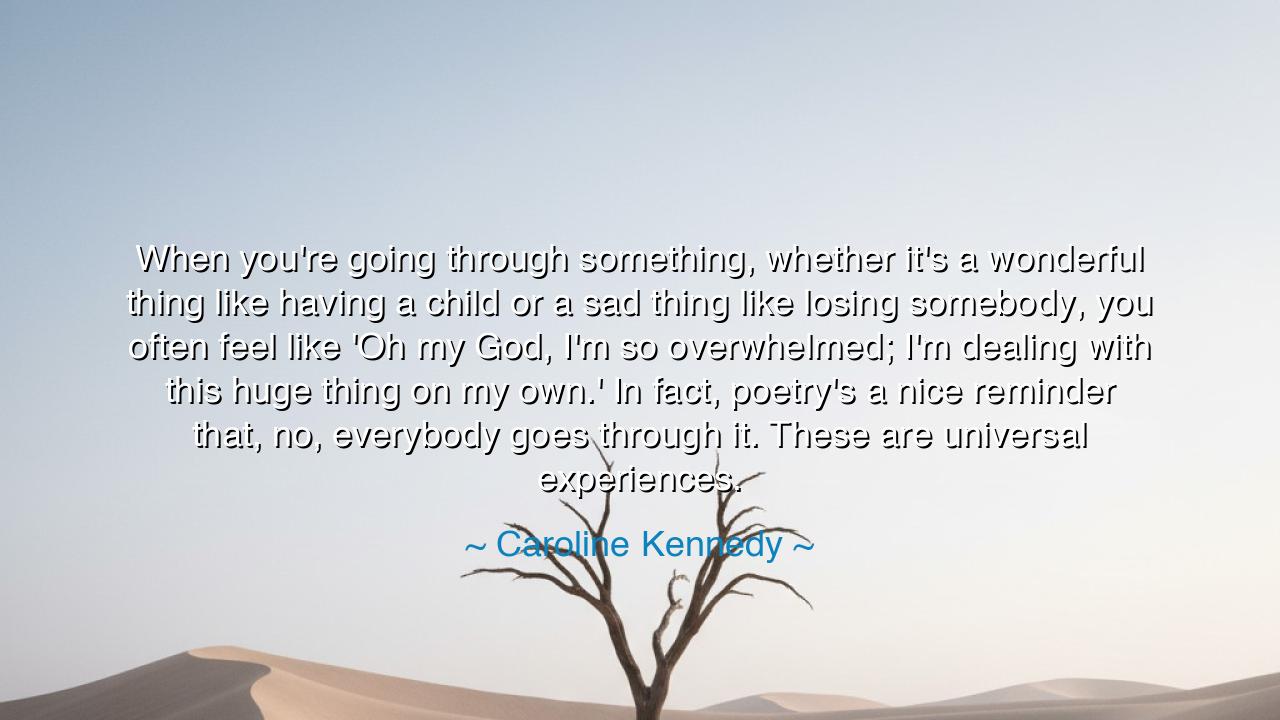
When you're going through something, whether it's a wonderful
When you're going through something, whether it's a wonderful thing like having a child or a sad thing like losing somebody, you often feel like 'Oh my God, I'm so overwhelmed; I'm dealing with this huge thing on my own.' In fact, poetry's a nice reminder that, no, everybody goes through it. These are universal experiences.






Hear now the words of Caroline Kennedy, who, standing in the long shadow of both triumph and tragedy, spoke with the voice of one who has known the breadth of human experience: “When you're going through something, whether it's a wonderful thing like having a child or a sad thing like losing somebody, you often feel like 'Oh my God, I'm so overwhelmed; I'm dealing with this huge thing on my own.' In fact, poetry's a nice reminder that, no, everybody goes through it. These are universal experiences.” In this saying lies both solace and strength, for it reminds us that though each soul feels its suffering or its joy as solitary, in truth it partakes of a great human chorus, eternal and unbroken.
The heart of the quote lies in the feeling of being overwhelmed. Whether in the ecstasy of birth or the abyss of loss, man feels the weight of his experience pressing upon him as though none have borne it before. The new mother holding her child may feel she is alone in the immensity of her love; the mourner at a grave may feel isolated in the cold of grief. But Kennedy, with gentle wisdom, reminds us that these are not alien moments, but universal experiences—the shared lot of mankind since the dawn of time.
Here enters the gift of poetry. For poetry is the bridge between solitary hearts. When one reads a verse written centuries ago and finds their own sorrow or joy reflected in it, they discover that they are not alone, but part of a lineage of souls who have laughed, wept, feared, and loved. The words of a Sappho, a Rumi, a Shakespeare, or a Dickinson rise from the page and whisper: “I too have felt this.” And thus, poetry becomes a lamp in the darkness, showing that what we thought was unique to us is in truth the shared fabric of humanity.
History offers many mirrors of this truth. Recall the soldiers of the First World War, knee-deep in mud, writing verses in trenches. Their poetry, born of horror and despair, spoke not only of their personal anguish but of the anguish of millions. Wilfred Owen’s words, “My subject is War, and the pity of War,” became not his cry alone, but the cry of a generation. Through his poetry, men and women who had never seen the battlefield could touch the soldier’s pain and know that grief, though individual, was also collective.
Nor is this wisdom reserved only for sorrow. Consider the Psalms of David, written in moments of exaltation and despair alike. In them, he praised with joy, lamented with tears, and pleaded with God in anguish. Thousands of years later, people still find their own voices in his words. This is the power Kennedy points to: the ability of poetry to remind us that the personal is also eternal, that our greatest burdens and blessings are shared across time, culture, and nation.
Therefore, O listener, the teaching is clear: when you are struck by life’s storms or carried away by its blessings, do not be deceived into thinking you are alone. Seek out the words of poets, of writers, of kindred spirits, and there you will find proof that others have walked this path before you. To know this is to be strengthened, for solitude is the heaviest burden, but shared experience is a balm to the heart.
Practical is this counsel: make poetry a companion in your journey. When you rejoice, let it give your joy greater voice; when you grieve, let it hold your sorrow in words you cannot form. And beyond poetry, seek conversation, community, and remembrance, for in sharing, the overwhelming becomes bearable, and the unbearable becomes survivable. Remember always that the deepest truths of life are not yours alone, but belong to all mankind.
Thus, take Caroline Kennedy’s wisdom into your soul: these are universal experiences. Whether joy or sorrow, life binds us together with unseen threads. And poetry, the song of the human spirit, reveals these threads and weaves them into a tapestry that declares: you are not alone. To know this is to walk in strength, and to endure with courage, whatever the days may bring.






AAdministratorAdministrator
Welcome, honored guests. Please leave a comment, we will respond soon